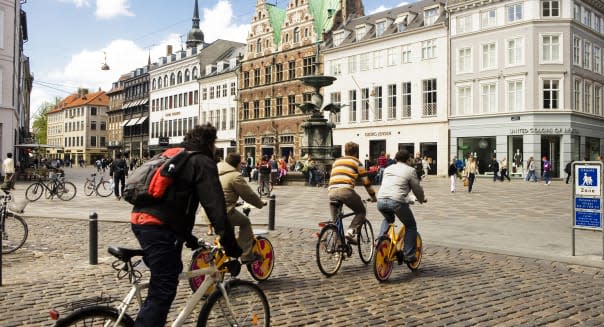Bikes Are Outselling Cars in Europe, & 6 More Things You'll Want to Know Today

Here's a quick rundown from the world of business and economics this morning: the things you need to know, and some you'll just want to know.
• Forget about horsepower: In the EU, people now favor pedal power. Last year, bikes outsold new cars in nearly every European nation for the first time since World War II. And though bike sales are up, it's not just Europe's environmentally-minded, bike-friendly ethos that should get the credit: Europe's car sales took a big hit during its Great Recession, which was longer and more painful the the U.S. downturn.
• Most Americans do most of their investing through mutual funds, retirement accounts or other intermediaries. But the institutions that handle your investments have been plagued for years by the predations of high-frequency traders, who manipulate prices with technical hacks that sometimes come down to gaming the very laws of physics. And when high-frequency traders profit, the rest of us lose. Until now: Our friends at Quartz report that a new market named IEX is launching Friday, run by a group of ultra-clever Wall Streeters whom IEX CEO Brad Katsuyama jokingly describes as the Navy SEALs of the trading world. Its goal: To change the game and hobble the high-frequency traders.
• By now, everyone knows the popular wisdom that Microsoft (MSFT) is past its prime, a technology giant slowly fading into decline. But don't tell that to its accountants: Microsoft turned in a significantly better than expected quarterly earnings report Thursday, sending the stock up 5 percent in after-hours trading. And what propelled its rising profits? Strong sales of its boring old Office and server software to businesses.
%VIRTUAL-article-sponsoredlinks%• Millions of Americans are trying to get health care through the glitch-ridden Healthcare.gov site, and as we all know, most are failing. While the tech cavalry rides (we hope) to the rescue, the Department of Health and Human Services has apologized for the mess in a blog post, but the most interesting part of that post has to be the user comments. Take, for example, the elderly couple who were told by the website that they were ineligible for insurance because they were in jail. (Spoiler alert: They've never even been arrested.)
• YouTube plans to launch a subscription music service as soon as December, putting it into direct competition with Spotify, Pandora (P) and others. Seems like a natural fit for YouTube (GOOG): The online video site already is the most popular on-demand music supplier in the world.
• Low-cost carrier Southwest Airlines (LUV) expanded into the top tier of U.S. airlines in part by refusing to follow its peers' lead and charge passengers to check their bags. And its CEO, Gary Kelly, said again Thursday that it intends to hold onto the policy that has been such a huge part of its marketing -- at least for the moment. But he also said that policy wasn't set in stone. If customer attitudes change, and people come to prefer the a la carte pricing strategy that includes baggage fees, Southwest could stop letting bags fly free.
• And finally, Canadian researchers say that paying living people $10,000 to become kidney donors would actually save money compared the current system, which operates on altruism alone. Whether its ethical to essentially sell human body parts is a whole other question.

